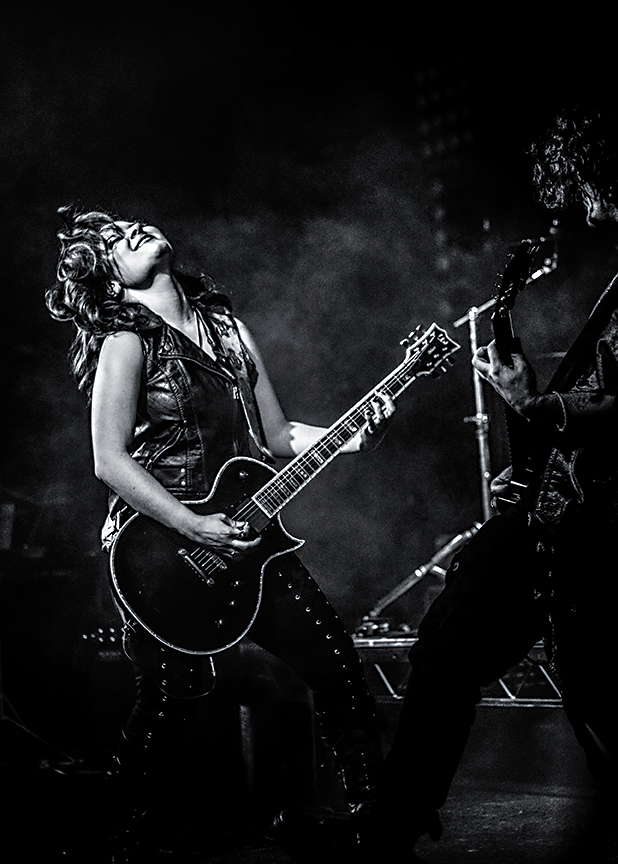Initially written for and posted on Nippertown. Part 1 (on blog) here.
Editor’s Note: This is the second part of the powerful interview with local rock star, Moriah Formica, a motivated and talented musician that was on the reality TV music competitions, American Idol and The Voice. Be sure to read the first part of this exclusive interview by Nippertown’s Elissa Ebersold, of what happens when the cameras stop rolling.

EE: What do you feel you’ve learned the most since your stints on reality music competition television?
MF: One of the things I’ve learned the most is endurance. You have to have a lot of endurance. There are going to be so many times where you feel, or you know, that I can’t do this tomorrow. I really can’t do this tomorrow. And you can wake up the next morning, and you can throw up because of how nervous or sick you are. You can cry however many times you want. But at the end of the day, if you’re on a reality show, or you have a show, it doesn’t matter. You have to do it and everything is gonna turn out fine. When I was on Idol, however brief, one of the rounds, the group round, we didn’t go to bed until 4:30 and our call time was at 6am. I woke up that morning and I was crying to my mom, “I can’t do this” and I was ready to quit. I woke up that morning after an hour of sleep and I have never felt more nauseous in my life. I thought I was going to throw up. I was so sick I could hardly walk. I was staggering all over the room. I was so overcome with tiredness and defeat and anxiety and fear, but at the end of the day I went and I did it. And I got through that round. Endurance is one of the biggest things that I’ve learned from reality TV. You’re gonna feel sometimes that you don’t want to do something, or feel that you can’t, but at the end of the day, it doesn’t matter. I barely had a voice for my Knockout and Playoff rounds on The Voice. You have to find somewhere to just pull it out of you and just do it.
I also learned that you have to have a sense of who you are and you have to stick with it. Because if you go on reality TV and you have no sense of who you are as an artist, it’s just not gonna be good. You’ll have no idea what to do with it once you’re done with it. You won’t know how to advertise yourself.
And you have to have a thick skin. That’s one of the biggest things. You’re gonna hear so many things that piss you off, or make you sad, or make you feel that you’re never gonna be successful. You have to either take it as constructive criticism, or if it’s hate, then just be like, you just gotta say “fuck you.” Atlantic Records told me when I was fourteen that I had to lose weight because I was “too thick.” At fourteen!
EE: Well that is seriously disgusting.
MF: You’re gonna hear things that are gonna be awful to hear if you get into it at a young age. You have to have thick skin. You’re gonna be told the brutal honest truth. You’re gonna be told by people that are of high status in the music industry—they’ll be totally honest with you because they don’t have time for anything else. They’ll be like, “Hey, you know it’s a good song, but there’s nothing really special about it. I don’t know if I can do much with it.”
At first, it’s like, “What the fuck?” But as you get older, you’re like, “Okay, it wasn’t this song, but maybe it’ll be the next one.”
The fourth thing I learned is that everything will always be okay. Always. Even if it feels like it’s not ever going to be okay. Everything is temporary. It really puts things into perspective.
EE: You are full of so much wisdom.
MF: Thank you.
EE: What about being in the public eye?
MF: One thing that I’ve learned is you have to be more mindful of how you act in public and what you say. And how things come across. That doesn’t mean being somebody completely different because I’m certainly not. Just means being more mindful. Think about how that makes someone feel because you are being viewed by a bigger amount of people than more people are.
I would say you have to take what people say with a grain of salt. One or two harsh comments don’t mean shit in the grand scheme of things. Also you can’t trust just anyone. Pick a close circle of people and stick with them. Truth is, people are fake, especially if you’re in a certain, um, status in their mind or in society.
You can’t really go places alone, or you shouldn’t, if you’re a small female. If you’re 4’11” like me, and if there’s a creepy [person] who sees an opportunity, don’t expect them to hesitate. So I don’t really go anywhere alone.
There’s also a certain amount of, I don’t want to say responsibility or pressure, because I don’t think I’m at that status yet. Where things are too much pressure to be a positive role model, but I know that it can be for people of a bigger status. But I do get a taste of that. You don’t want to disappoint people. It does make you feel a bigger sense of responsibility to just be kind and to listen to people and to be understanding.You see how much you impact people and help them in their lives. For me it’s a very positive thing because I want to be that for people. I don’t see how that can be negative for anyone, but for some people it could be.
EE: What would you have changed about your experience on the show?
MF: I just wouldn’t have done Idol. I never had a good feeling about it. Although, actually, to be honest, I don’t know if I’d change anything [….] Some people might ask if I’d change the coach that I’d picked on The Voice. No, Because I wouldn’t have met the amazing people I’d met by being on Team Miley. I wouldn’t have met my best friend Ilianna [Viramontes]. And I wouldn’t have met one of my dear friends Janice Freeman. I wouldn’t have been a part of Voice history where it was the first all-female team. So I really wouldn’t change it to be honest. I wouldn’t even have changed my position in the show. Because if I won—This isn’t a diss to Chloe [Kohanski] or anything, I love her. Is her name huge out there right now? No. So I know for a fact that if you don’t win, you’re almost better off. You can do what you want. And you can take the exposure that you got and use it to your advantage, which is what you have to do. That’s one of the biggest benefits of these shows. It’s not the record deal, it’s not the albums that you record. I honestly feel like those harm the people the most. I really honestly wouldn’t change anything, even with American Idol. Even sometimes negative experiences are super beneficial to you in the long run. It’s so cliche, they really do make you stronger. And it’s true.

EE: What about changes you’d make to the music industry as a whole?
MF: [SCOFF] There’s so much. I would change what’s mainstream. I wouldn’t want to say that rap and pop shouldn’t be mainstream, or anything. I love a lot of that stuff. But I would make what’s mainstream more diverse. My dad always tells me stories about how 92.3 was back in the day. You could hear Michael Jackson or you could hear Cyndi Lauper or you could hear Poison. Or you could hear Skid Row. You could hear all different sorts of things on Fly92. Whereas now, you get a selection of…you get one thing.
EE: It all falls into the cookie cutter.
MF: You get one thing. Rather than giving you a nice variety of things. You’re fed whatever they want to feed you. In a way I feel bad because a lot of these people who are fed this, the music that they are fed today, they are being enslaved in their minds because they don’t think they have an option. They think, “This is what’s hot! This is what’s out there today.” Because that’s what they’re being fed.
EE: You vote with your ears. And your wallet.
MF: You vote with your ears, yeah, but some people, I’m telling you, a lot of people that I meet are kinda just…they’re very impressionable. The masses are kinda sheep, who will follow trends or bind to what is being said in the media or mainstream and not really bother to look anywhere else. Why would you? That’s what you’re being fed. A lot of people’s minds are asleep. They’re waking up a lot more, especially with all the shit that’s happening in the world. But they don’t feel the need to think past, “Hey is this it? Is there something else that could be hot?”
I think one thing that I would first and foremost change would change the sexuality of women. I just hate that with a passion. I hate that sex sells. I think to myself…how many women out there with careers would they be out there if they didn’t push [or were forced to push?] their sexuality and their looks. It’s sad. I see so many girls trying to make it and they’re just pushing their looks and their sexuality. Okay, but it’s gonna leave you feeling empty anyways. You can have all the money, but what kind of satisfaction do you feel by getting famous off of your sexuality. It must be an empty, sad feeling after a while. I’m not saying they don’t have any impact on people, but I think you’re minimizing the impact you could have by pushing so much of your sexuality. Be who you want to be. It’s different if you’re a woman and you want to push that. This is my body, I could do that if I wanted to. But I think for the majority of people—I don’t know a lot of people that want that—that “I love going on stage with half of my boobs showing.” As a woman myself I don’t feel the need for that. I think it’s sad and it’s bullshit. […]
And hip hop culture today…mainstream hip hop culture is absolutely disgusting in my opinion. I don’t hear any wholesome hip hop songs. That is one of the reasons I love the rapper CupcakKe. Yeah, she makes songs that are really explicit and provocative and graphic, but at the same time she also makes songs about what it’s really like to struggle in the world and in the inner city. About what it’s like to be black in America. It’s not always about “Yeah I’m in the club. Getting pussy in the passenger seat. Blah blah blah.” Just shit that is garbage that you don’t need.

EE: Where’s my Sugar Hill Gang? Bring them back.
MF: Yeah! I really think it has an effect on young men. They then think it’s cool and young men become entitled. “Ty Dolla $ign said this about her,” and then girls start to think that that’s the norm. What are you doing to yourself? Little men you’re becoming boys because you don’t know how to be a man with this garbage that you’re fed and it’s just a vicious cycle of stupidity. As amazing and impactful as the music industry is, it’s also one of the worst things to have happened to some kids nowadays. It’s awful what’s being pushed.
I would also change how you have to build yourself nowadays. Back in the day, the record labels had money so they were willing to spend money on you to take a shot on you. “You’re so talented, so let’s spend this money on you to get you out there. To get you advertised. To get you shows. We’re gonna make an album. We’re gonna push this for you. We’re gonna help you build.”
Now what it is is they “don’t have the money to spend on you,” and “we’re not gonna take a shot on you because we don’t have that money. Come back and we’ll think about signing you when you already have 200,000 followers.” You have to build yourself and then prove, “Hey, Record Label! Look! People actually like me on social media. Now am I worth your money and your time?” That’s also something I would change. I could go on and on about what I would change about Hollywood as a whole, but that’s an entirely separate interview in and of itself.
EE: Another time then. If you could choose one lyric / set of lyrics that you’ve written as your favorite, which would it be?
MF: “My eyes are distorted from the lies that you’ve spoken.” Because it just sums up that if you’re hurt really bad, you start to see things in a different light. You might look at something that made you happy, and now it makes you angry or sad or bitter. It’s all because how that person hurt you or betrayed you or lied to you. I really like those lyrics. “I see things that aren’t true, and I see this subject in a whole different light now because of how you’ve fucked me over.”
Also “I hate that I love you,” also from “I Hate.” It’s simple. It’s straightforward. It’s something you could hear in a song. It’s something you could hear someone say in a conversation. It’s so true. I feel everything up here [GESTURES ABOVE HEAD] or down here [GESTURES LOW]. There’s no in the middle with me, in case you couldn’t tell. I’m either really passionate about it or I hate it. And even if I hate something I’m really passionate about hating it. [LAUGHS]. That’s why I think music is the perfect career for me because people who feel so passionately like that. I think it’s really hard for us to find outlets that help us deal with those emotions because we’re always either feeling things up here or down there. There’s never consistency.
This particular person that I wrote this song about, I hated so much that I loved this person. In the song I never say, “I hate you.” The point is that the verses are hey, this is how you’ve affected me. You hurt me. My wounds are open. I can’t hide it. This is how you’ve affected me because of what you did. The chorus is, you know, I hate all these things about you. I hate so many things about you because of how bad you hurt me and at the end, it’s I hate that I love you. But I can’t bring myself to say I hate you, because I don’t, because I love you. If that makes sense.
EE: More than I’d like to admit. It’s universally relatable. My college writing professor would scold me for using the word relatable but that’s what it is. It’s an emotion that everyone will experience at least once in your life.
MF: Precisely.
EE: You have a lot of young fans who look up to you…I see them doe-eyed at your shows. What advice do you have to the ones who want to follow in your footsteps and pursue music as a career? Sorry if you’ve gotten it a hundred times before.
MF: I actually really like this question because it’s always another opportunity to put the right information out there. It’s cliche, but always follow your gut and always be true to yourself. Take constructive criticism, take into account what people say, but if after all that and you’ve had a minute to think about it and you’re still not feeling it, don’t pursue something that your gut is absolutely going against. Most of the time, your gut is [in the right]. Take constructive criticism. It might suck, it might hurt at first, but it’ll allow you to be a more humble person and it honestly allows you to get better. Because a lot of times when you get constructive criticism, it’s true. It helps you become better in the long run. I think that was the shortest answer I’ve given!
EE: So I have to ask about your love of reptiles.
MF: I always love to talk about reptiles!
EE: When did that start? How many do you have?
MF: I’ve always loved animals. My fascination with reptiles and amphibians since I was little. We used to live on the country side of Clifton Park. We drank well water and we didn’t have cable. That was how we lived up until I was about six. One of the things about that spot was we had snakes everywhere. Literally everywhere. And my dad would always be like, “Yo Moriah, that’s a garter snake. That’s a milk snake. That’s a copperhead.”
I’d be like, “That’s so interesting. Every snake has a different name but it’s still a snake!”
I remember just finding them so interesting when I was little. My grandmother’s brother-in-law ended up catching one snake that I kept for a week. I named him Drake the Snake. At five years old. I would go out and catch crickets and toads and frogs and whatnot and feed them to him. […] Ever since I had him I’ve had a fascination with reptiles. When I was 12 I got my first snake.
EE: How many snakes do you have now?
MF: Now I have two snakes and two lizards. I did have three snakes, but unfortunately several months ago my ball python Patch died very unexpectedly. She was about six years old.

EE: That’s a short life for a snake, right?
MF: Oh yeah, very short. I was kinda just like “what the fuck.” She was always a fragile snake. I could probably count on one hand the amount of times she ate. She was a finicky eater. She would go on 10 month fasts, which is normal for a ball python, that they’ll eat whenever they’re hungry. She got pneumonia randomly. She hadn’t shown any signs of a respiratory infection. No wheezing, no bubbles or discharge from the nose or mouth. and one day I saw her and she looked terrible. She didn’t shed, which was odd, so I knew something wasn’t right. I found her one day and her head was tilted to the side and as soon as I saw her, I knew she was gonna die. The exotic vets are only twice a week, and of course they weren’t in that day. I couldn’t make an appointment and I had a show that night, so I just tried to keep her comfortable at that point. I came back later that night and she was dead.
EE: I’m sorry. Poor thing.
MF: It’s alright. It is what it is. It’s just a part of owning animals. It sucks. I’m just happy to have owned her. She was probably the sweetest one of all my snakes. I do plan on getting another one. I don’t know when. Probably when all this corona craziness is over.
EE: So obviously everything performance wise is all mixed up because of the pandemic. What can we expect from you going forward?
MF: I plan to do more livestreams. I was surprised at how many people enjoyed and engaged and stayed. I was very humbled and flattered that I could make that big of an impact in people’s days […] I want to do this more over the next couple weeks, or however long this goes on because right now there’s no telling. I’m definitely going to write a lot. I’m writing as we speak. I have my Pro Tools session up right now. There’s a new project in the works. I might give little teasers of songs that I’m writing or working on. I’m just gonna keep doing what I can to stay active and stay involved and engage with people. Especially for rock artists, our livelihood is playing live, so it’s like, “what the fuck, what do we do now?” The good thing about being 19 is that I have an OK understanding of how to use social media.
EE: Fair to say that the quarantines and social distancing are helping your creativity, rather than hurting?
MF: Definitely. Going out with people is not an option. Not that I do much of that anyway because I don’t really like people! [LAUGHS]. Gives you a ton to think about.
EE: You might get mad at me for this question. Will we ever get to hear the song with your brother Gabe you decided not to release?
MF: I don’t think so […] If we do a more rocked up version, then maybe. I don’t know. I will never say never.
EE: What gear do you use?
MF: For guitars I play ESP Guitars. I’m endorsed by them. They are my favorite guitars. I have no interest in using anything else, especially as a lead singer. They’re more light than other guitars I’ve played, so it doesn’t crush my diaphram on stage. I got to play Lzzy’s Explorer when we were doing the show with them. How the hell does this woman frikken sing when she plays this thing? This is the heaviest frikken thing! It was so heavy! It would crush my diaphram! But she’s also much bigger than I am.
Amps right now I am using Marshall. That I am open to change, as long as I play an amp where I can find a tone that I want. I’m willing to change. I’m not married to any amp brand right now. I am interested in playing Randall amps. A lot of the metal guitarists that I see play, and I love their tone, they play Randall. Like Henry Flury from the Butcher Babies. I love his guitar tone, and he plays a Randall, so I want to experiment with that.
Mics. I don’t really have a preference. I dont bring my own mics [to gigs], but I probably should if there’s another outbreak like this. To stay healthy.
EE: Let’s hope there’s not another outbreak like this.
MF: Another endorsement I have is Ernie Ball guitar strings. I absolutely love these. They’re super bright. They’re super strong. They last for a long time. They also make great guitar picks—I use the Prodigy ones. They’re super strong. I think they’re 1.5mm but I can’t be sure. ((Elissa’s note: research indicates the Ernie Ball Prodigy picks are 1.5mm, as Moriah indicated)). This Chicken Pick [HOLDS UP PICK], I love this pick, right? It’s 2.6mm which is really thick for a pick, but I love the tone it has. It makes picking certain things so much easier. And it’s much smoother.
EE: What is a question you always wish an interviewer would ask, but never does?
MF: That question! Honestly I love that question. Um. Hm. Honestly I wish they would ask me more about my animals and my reptiles. I love reptiles and I love animals, and I love talking about them. I have literally joined reptile forums to just compare notes with other reptile hobbyists. “How do we feel about the temps for this boa constrictor?” I’m such a geek when it comes to reptiles!
EE: How can the Nippertown readers help you out moving forward?
MF: The cliche…follow my social media like my Facebook and my Instagram. Feel free to reach out, ask me questions, send requests. If you want a personal message from me on Cameo if you need a pick-me-up or happy birthday message or something. Any sort of way that they want to show support. Or even if they just read this article is A-OKAY with me. I am appreciative of any sort of support I can get. I don’t have any specific requests.
EE: Well that is it. Thank you so much for chatting with me. It has been a delightful [CHECKS CLOCK] hour and fifty minutes (or fourteen pages)! And you have my permission to bully your brother. 🙂
MF: YES!
Gabe Formica, from the other room: What did you say about me!?
And that’s a wrap.

